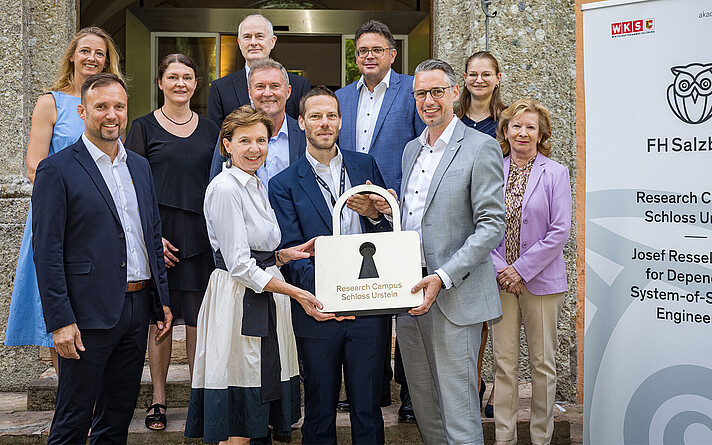The first Josef Ressel Research Centre was opened at Salzburg University of Applied Sciences 10 years ago. The start of a success story: FH Salzburg can now look back on three Josef Ressel Cen-tres, two of which are currently still running. These are not only characterised by research in terms of content, but are also always "a little bit more" for the university: an ecosystem for exchange, network-ing and cooperation. The goal of the "Research Campus Schloss Urstein" (RCSU), which was official-ly opened today, 10 July 2023, is to further institutionalise this space for ideas.

Promoting exchange and young researchers
"The Research Campus is intended to be a meeting place where employees, students and corporate partners can cooperate in a low-threshold manner. An inspiring space where students, who perhaps want to know a little more, can work together with 'professionals' and find an environment in which they can develop themselves, try things out and may even make a first contact with industry," says Christian Neureiter, director of the Josef Ressel Center for Dependable System of Systems Engineering (DeSoS), emphasising the added value for students who want to pursue a scientific career or "get a taste" of research.
Because what is already standard in the start-up and corporate world, for example in co-working spaces, is often missing in research, namely the actual space for exchange. Christian Neureiter was looking for the perfect workplace for the growing research team in 2020. Together with his team, he created an inspiring place in the baroque walls of Urstein Castle, where the research group - especially after Corona - enjoys spending time together even after work. It quickly became clear that this kind of collaboration, especially for the younger colleagues and students, is fertile ground for new projects. The idea of a "research commune" took shape.
Interdisciplinary orientation
First and foremost, the RCSU emerged from the JRZ DeSoS, which means that the team and topics are very much rooted in the context of "Systems Engineering". Currently, the further development is also oriented towards the newly designed study programmes at the Department of Information Technologies and Digitalisation. "In the spirit of a flat-sharing community, we also want to think more openly and promote interdisciplinary cooperation. For example, a joint research project has just been launched with colleagues from the Department of Green Engineering and Circular Design at the Kuchl Campus," explains Neureiter.
Close cooperation between business and research
Dominik Engel, Managing Director of FH Salzburg, emphasises:
"The establishment of this unique “research-sharing community, is a milestone for FH Salzburg on the way to further expanding our strong application-oriented research. The partnership with renowned companies underlines the relevance and potential of this initiative - together we work on problems from practice and in turn contribute our findings to the state of the art in knowledge and technology. This is also a great added value for our students - they can write their papers on real issues and get a taste of 'research air' at the same time."
The RCSU is funded by the state of Salzburg until 2025 as part of the WISS2030 strategy. In addition to the state, the FH itself and its sponsors, the Chamber of Commerce and the Chamber of Labour, have also thrown their support behind the project. The first corporate partners are also convinced by the idea: on the one hand, there are the partners of the JRZ DeSos (Bosch, Siemens, Chargepoint, Geoconsult and Palfinger), from which the centrepiece on the ground floor of the castle is fed, so to speak. In addition, there are new corporate partners who believe in the idea of the research commune and the associated upgrading of the location. These include Porsche Informatik, Salzburg AG, Liebherr and the Förderverein ITS.
